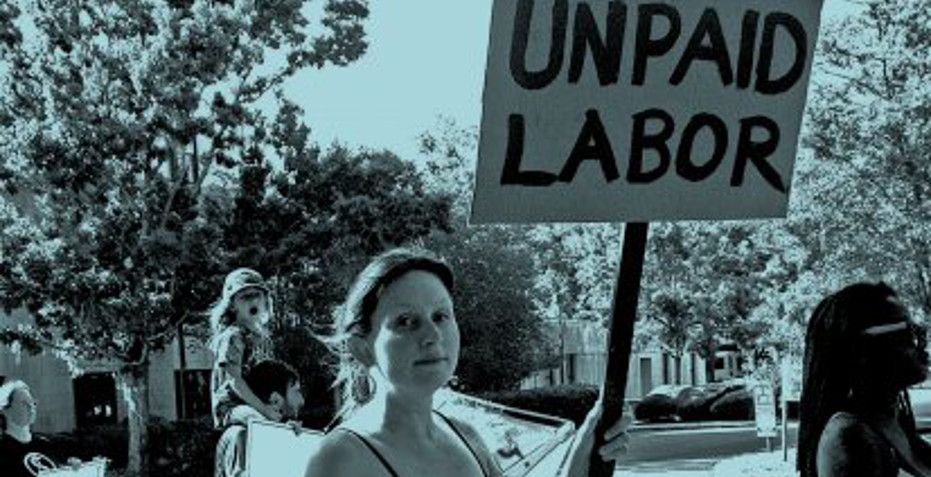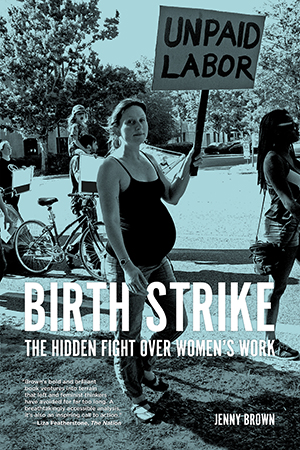By Darlena Cunha
Feminists Act
October 3rd, 2019
After a year of birth stagnation, the United States has hit an 80-year population low, and the numbers are continuing to decline.
What if this decline is a result of a birth strike? A conscious decision among women not to bear as many children as they historically have, if any at all?
A new book posits that this is the case, albeit unintentionally. Instead, the author argues, women no longer have the resources needed to care for larger families.
“The time crunch, the work, the expense, the afterschool, the summer programs, the exhaustion and physical toll…” Author Jenny Brown, who is also an organizer with National Women’s Liberation, listed the responsibilities of women like ticking off a to-do list.
In her book, “Birth Strike: The Hidden Fight Over Women’s Work,” Brown argues that the work of pregnancy, bearing children, and raising them, in addition to home responsibilities of laundry, cooking, and elder care, fall mainly on women. Because of this, women, whether they work outside the home or not, often experience a “double day”. With the strain of 16-hour work days and being responsible for so many, combined with financial worries, more women are making the decision not to have as many children as they once did.
“We are definitely not calling for a birth strike; we are observing that there is a spontaneous one,” Brown said. “This is a reaction to the factors around women right now. Women are saying ‘look, I just can’t do this, or if I can, I’m only going to have one.’ The spontaneous birth strike shows how hard the conditions are.”
And while many may think that planning families is a private, individual matter, it’s often anything but. With fewer citizens in the work force, the economy will slow in growth, which is something the government pays very close attention to. As immigration is an increasingly slim option, the ruling party is looking to American women to make up the difference, Brown says.
“The right wing is very big into the family,” she said. “When they emphasize the family, it’s not the nice things about a family – the love and joy – it’s about the production of other humans in the family and how that is going to occur, and how they can get women to do that without any compensation. Then they want them to work as well.” The point, she says, is to convince women to take up the slack so that the country doesn’t have to pay for legitimate social and family services that would benefit the people.
“Small government, big families. You cut social security, who is going to take care of the elders in the family? The women of the family. And those elders will be dependent on the kids for income, as well,” Brown said. “The government figures the family unit can take over the monetary and time stuff. They want families to take on those burdens rather than anything where tax money has to be spent because big corporations don’t want to be taxed.”
Could this be where the abortion bans come in? Lawmakers are making a grab for women’s rights in an increasingly fevered pitch, and Brown says the bans in states like Georgia, Ohio, Missouri, Mississippi, Alabama and others have many aims, but one of them is to enforce the current societal definitions that make our country work: the very definitions that help keep women in a state of perpetual unpaid labor. “How can we shame women to go into marriage, how do we force a family unit to get this unpaid labor loop started to get them off services?” she said. “The main point of the family is to have kids and provide all this, so the government won’t have to. Without those families and kids, the system will start to break down.”
The birth rate in the United States is currently 1.76 children per woman, with no sign of a bounce back to the previously expected two children per woman. Brown says this is because we’re not responding as a country in a way that makes women feel comfortable enough to have more children. In some European countries, the response to a low birth rate was to make it easier for women to have children and also have a fulfilling career, with better childcare, maternity leave, and family programs to support them. Here, she says, the response has been to make it harder for women to get contraception and abortions, a solution that costs significantly less than social supports.
“The main message to take away is for women to understand that the stress they experience when they have kids, all of that is our country trying to arrange child rearing and child birthing on the cheap,” she said. “It is not our fault that this is a system designed to get our work at the lowest possible rate,” she said. “We don’t want to direct our rage at other women who seem to have it all; we want to point that toward corporations.”
Brown says the best thing women can do to stop this cycle is to step outside of it ourselves, to integrate our needs and wants with those of other oppressed groups, and to take a stand, demanding our work be rewarded and our needs met. She encourages joining local women’s groups, labor unions and other organizations that work on the ground for change at a systemic level.
“The first step is to know that the U.S. doesn’t have it the best: there are other systems that are great, and we could have it here,” Brown said. “We need to be demanding this stuff. And to win these things, we are going to need a lot more solidarity, and a movement divided by race or status can’t bridge gaps. We need universal programs. We are all in this together.”
In order to help, we must understand that women’s rights are human rights and only by bolstering them can we create a society that thrives through generations of births and solid family footing. The first step is supporting women’s healthcare. You can do this by donating or volunteering at Planned Parenthood or your local women’s healthcare clinics on the civil level. Of course, to enact long-term solutions, we also need ensure women’s bodily autonomy is protected at the state and federal levels. Call or write your legislators and let them know that this is an issue you vote on. When women start having families, we need to ensure there is a support system in place, so that they can provide for themselves and their children without exhausting themselves. Call your congresspeople about maternity leave and child care issues—the mere basic of needs women have in order to continue to have children and ensure their futures.
Learn more about Birth Strike: The Hidden Fight Over Women’s Work by Jenny Brown or purchase it in bookstores or online.
Darlena Cunha is an adjunct professor of journalism at The University of Florida and a freelance writer who frequently contributes to The Washington Post, TIME and The Atlantic.







